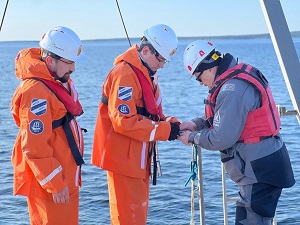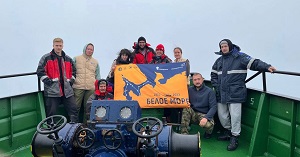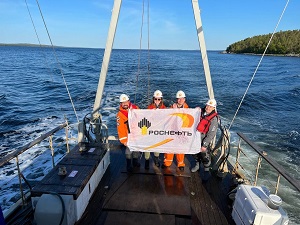Rosneft and Innopraktika Launch Large-Scale Environmental Project in the White Sea

Rosneft and Innopraktika, a non-governmental development institute, opened the first field season of a three-year environmental project in the White Sea. Two research vessels – Professor Zenkevich and Kartesh – have started work in the western and eastern parts of the waters. During the expeditions, scientists will reproduce the oceanological survey made 100 years ago by Konstantin Deryugin, one of the founders of Russian hydrobiology.
A new environmental project in the White Sea is part of Rosneft's extensive research programme in the Russian Arctic. The Company's Arctic Research Centre is carrying out the most ambitious programme of research in the region since Soviet times, with more than 40 major expeditions over the past 10 years and unprecedented geographical coverage of hydrometeorological, geological and biological research.
 The purpose of Rosneft and Innopraktika's large-scale research in the White Sea is to assess the impact of global climatic and local anthropogenic factors on the state of ecosystems in the northern seas. Scientific teams from the Professor Zenkevich and Kartesh ships are taking samples of bacterio-, phyto-, ichthyo- and zooplankton, studying communities of bottom organisms at the same points in the water area and using the same methods as a century ago. Current data on climatic, hydrological and biological parameters of the White Sea will be compared with the results of Deryugin's research in 1922-1923. This accuracy and authenticity is necessary to provide a sound scientific answer to the question of what climatic and environmental changes have occurred in the Russian Arctic over a century-long period.
The purpose of Rosneft and Innopraktika's large-scale research in the White Sea is to assess the impact of global climatic and local anthropogenic factors on the state of ecosystems in the northern seas. Scientific teams from the Professor Zenkevich and Kartesh ships are taking samples of bacterio-, phyto-, ichthyo- and zooplankton, studying communities of bottom organisms at the same points in the water area and using the same methods as a century ago. Current data on climatic, hydrological and biological parameters of the White Sea will be compared with the results of Deryugin's research in 1922-1923. This accuracy and authenticity is necessary to provide a sound scientific answer to the question of what climatic and environmental changes have occurred in the Russian Arctic over a century-long period.
 At the same time, Rosneft and Innopraktika's environmental project will use the most advanced equipment and innovative methods, including the use of underwater drones to survey the bottom of the White Sea and molecular genetic analysis of the organisms found using the world's only sequencer above the Arctic Circle. This will provide new data on the fauna of Arctic marine ecosystems and is likely to reveal species not yet known to science.
At the same time, Rosneft and Innopraktika's environmental project will use the most advanced equipment and innovative methods, including the use of underwater drones to survey the bottom of the White Sea and molecular genetic analysis of the organisms found using the world's only sequencer above the Arctic Circle. This will provide new data on the fauna of Arctic marine ecosystems and is likely to reveal species not yet known to science.
The Rosneft-Innopraktika project will result in the creation of a comprehensive database of scientific data and the development of methodological bases for monitoring the ecological state of the Western Arctic seas using new-generation technologies. This information and tools are necessary for long-term planning of sustainable development in the Arctic region of Russia.
In order to implement the Rosneft and Innopraktika project in the White Sea, an effective system of cooperation between profile specialists from the country's leading research centres has been established. Participants include the Faculty of Biology of Lomonosov Moscow State University, the Marine Research Centre of Lomonosov Moscow State University, the Shirshov Institute of Oceanology of the Russian Academy of Sciences, the Faculty of Biology of St Petersburg State University and the Zoological Institute of the Russian Academy of Sciences. The project was based at the White Sea Biological Station of Lomonosov Moscow State University.
Note for editors:
Three-year ecological research in the White Sea is not the only project Rosneft and Innopraktika are carrying out at the Lomonosov Moscow State University's White Sea Biological Station. . The Company is currently testing a microbial preparation that ensures a high level of hydrocarbon utilisation in marine and cold climate conditions in the laboratories of the flow-through aquarium systems building, which was modernised with the Company's support.
Rosneft
Information Division
July 10, 2023